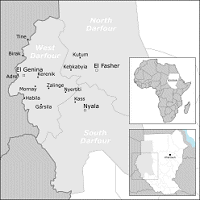New York, January 29, 2007 – Since late December 2006, new attacks in west Darfur, Sudan, have destroyed several villages and have led to the displacement of thousands of people. Displaced persons have found refuge in Ardamata and Dorti camps, situated on the outskirts of El Geneina, the capital of west Darfur, while other people remain blocked further north in Tanjeke.
While some 750 families—more than 5,000 persons—have so far been able to reach the Ardamata and Dorti camps, numerous others have been left behind and remain at the mercy of armed groups still active in the region. In the village of Tanjeke, located 30 km north of El Geneina, at least one thousand families are gathered in small, individual shelters made of grass and leaves that lack adequate roofs. The displaced persons also lack water and soon will be in need of food. People are mostly coming from the camps of Artega and Kouta and are on the run for the second time in less than three years. On January 19, a Doctors Without Borders/Médecins Sans Frontières (MSF) evaluation team was able to reach Tanjeke, but high levels of insecurity on the road have prevented any further intervention. This highly volatile environment leaves the already weakened displaced population without much needed assistance.
Meanwhile, in El Geneina, displaced persons continue to arrive in small groups, mostly at night due to the risk of attacks on the roads. There are many reports of acts of violence perpetrated against villagers. In Ardamata camp, MSF has set up a mobile medical unit to screen new arrivals, and more than 500 people have been treated. In addition, on January 8, non-food items such as water containers, blankets, and plastic-sheeting were distributed in Ardamata and Dorti camps to 750 families. High-energy protein biscuits have also been distributed to the displaced. A number of shelters have been erected.
"The living conditions in the camp are particularly difficult at this time of year, with temperatures falling to close to five degrees Celsius at night," said Stephane Reynier, MSF field coordinator in El Geneina. "The displaced population still trapped in the Sirba area are enduring very difficult conditions, in addition to coping with the insecure environment."
The constant insecurity in the region, and on the roads in particular, is rendering movements extremely difficult for aid workers. In Darfur today, accessing populations in need is, in many cases, impossible.
MSF has been working in west Darfur since January 2004. MSF, an independent international medical humanitarian organization, has been working in Darfur since 2003 and in west Darfur since 2004. MSF currently has over 2,000 staff working in 17 locations throughout Darfur.




